![]()
篪庵を購入する
アレックスが初めて祖谷に入ったのは1971年の夏です。その時すでに多くの家屋は放置されていました。1972年秋、アレックスは祖谷の集落、近隣の高知県の山、剣山の東側を散策しはじめました。数百軒の民家を訪れた後、彼は釣井集落にある一件の空家を見つけ、1973年6月に購入しました。そのときすでに空き家になって17年。元々、喜多という家族(現在は篪庵のすぐ下方に住む)の家でしたが、空き家になるまでに、何度か他の家族が住んだ時期もありました。
近所の人達たち
アレックスが越してくると、近所の人たちはすぐに様子を見に来てくれました。ある朝起きると、誰かが持ってきてくれたキュウリが縁側にあったとか。すぐ隣の尾茂さんは、祖谷の古い習慣を教えてくれました。今も私たちを支えてくれる素晴らしい友人です。
家に名前をつける
初めの頃からよく訪れていた詩人の南 相吉とアレックス、村の子供たち(当時はたくさんの子供たちがいました)は、ある晩集まって家の名前を考えました。
そして辞書をみて、小さな竹の横笛を意味する古い漢字「篪」を見つけ、草葺き屋根の家を意味する「庵」を繋げました。「笛の家」、篪庵の誕生です。
相吉が 古い曲に歌詞を付けて「篪庵の歌」をつくると、当時の村の子供たちはよくその歌をうたいました。
1988年の屋根の総葺き替え、現在理事長を務める「篪庵トラスト」の設立など、アレックスは篪庵という家と共に活動を続けてきました。
執筆
アレックスは著書『美しき日本の残像』(1993)の中で、篪庵との出会いを書いています。
2002年には『犬と鬼』を出版しました。日本の田舎が過疎化により崩壊する様子、古い街角から歴史的遺産が失われていく様子、数十年にわたる公共土木事業によって破壊されていく景観の様子が描かれています。そして、持続可能な観光の可能性、ありのままの自然と有機農業の価値を訴えてきました。
![]()
Purchasing Chiiori
When Alex first entered Iya in the summer of 1971, many houses were already abandoned. In the fall of 1972 Alex began looking throughout the villages of East and West Iya and also villages in neighboring mountain ranges in Kochi and on the eastern side of Mt Tsurugi. After exploring over a hundred houses, Alex settled on Chiiori, in the hamlet of Tsurui.
In June 1973, Alex bought the house. At the time it had been abandoned for seventeen years. Originally it belonged to the Kita 喜多 family (who live today just below Chiiori) for many generations, before changing hands several times before Alex found it.
Neighbors
Right from the beginning the neighbors came over to help. Sometimes Alex would wake up to find that someone had brought cucumbers and left them on the verandah. In particular, the closest neighbor, Omo 尾茂 taught Alex much old Iya lore, and remains to this day a great friend and supporter.
Naming the House
Early guests from outside Iya included poet Minami Shokichi 南 相吉, and one night Shokichi, Alex, and the village children (there were many in those days) got together and came up with a name for the house. The name they decided on was Chiiori 篪庵, made up of Chi 篪 an archaic little-used character they found in the dictionary for “Flute”, and Iori 庵, meaning “Thatched Cottage”. Hence Chiiori, meaning “House of the Flute.” Shokichi wrote a poem about it to music from an old Quaker song, and the children used to sing it.
Since those early days, Alex has continued to be involved with Chiiori, including its complete re-thatching in 1988, and the founding of Chiiori Trust, of which he is the Director.
Writings
Alex wrote a memoir of his finding of Chiiori in the first two chapters of his book Utsukushiki Nihon no Zanzo 『美しき日本の残像』("Last Glimpse of Beautiful Japan") published in Japanese in 1993, and in English in 1996 as Lost Japan.
In 2001, Alex published Dogs and Demons (Japanese edition 『犬と鬼』2002), which describes the collapse of Japan's rural areas due to depopulation, the loss of historic heritage in old cities, and the mechanism whereby Japan's countryside was damaged by a decades-long (and still on-going) massive public construction regime. Alex has called for the revival of rural areas through sustainable tourism and rediscovery of the value of the natural environment and organic agriculture.
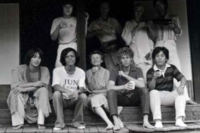
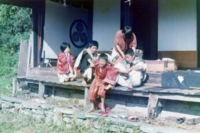
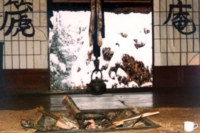
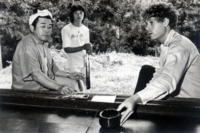
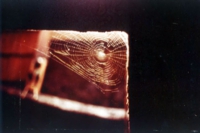
 the house
the house